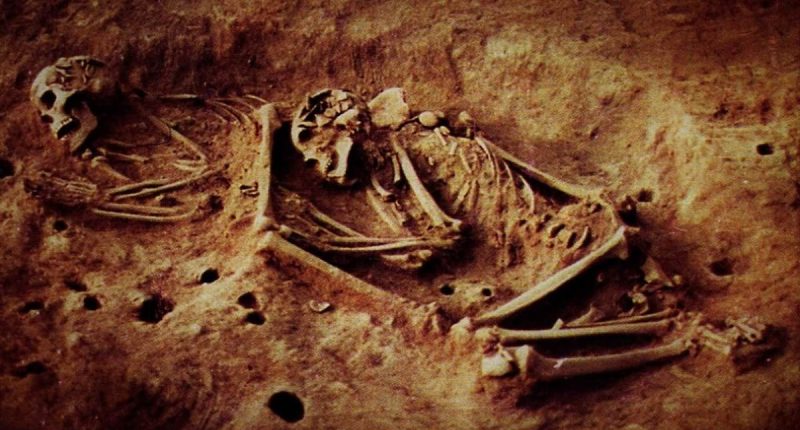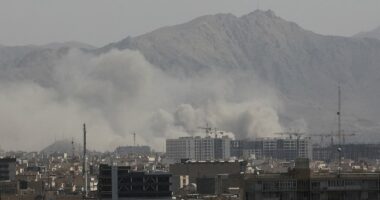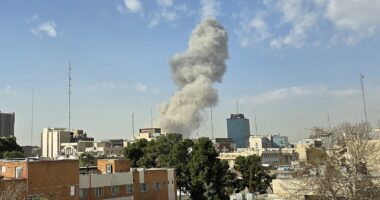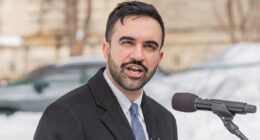Share this @internewscast.com
Archaeologists have uncovered 6,000-year-old skeletons in Colombia that belonged to a mysterious group of people that could rewrite human history.
The remains found at the ancient preceramic site of Checua near Bogotá belonged to hunter-gatherers whose DNA does not correspond with any known Indigenous populations in the present-day region.
Rather, their genetic profile indicates a distinct and extinct lineage that possibly descended from the earliest humans to enter South America, a group that diverged early and remained genetically isolated for thousands of years.
Through the analysis of ancient DNA from 21 individuals who lived in the Bogotá Altiplano from 6,000 to 500 years ago, researchers were able to reconstruct a unique genetic timeline covering nearly six millennia.
The DNA samples, extracted from bones and teeth, show that the oldest individuals at Checua carried a unique ancestral signature that has completely vanished from the modern gene pool.
Their lineage didn’t simply blend into others, but it disappeared entirely.
‘This area is key to understanding how the Americas were populated,’ said Kim-Louise Krettek, lead author and a Ph.D. student at the Senckenberg Center for Human Evolution in Germany.
‘It was the land bridge between North and South America and the meeting point of three major cultural regions: Mesoamerica, Amazonia, and the Andes.’

The skeletons of two hunter-gatherer individuals excavated at the Checua archaeological site (Bogotá Altiplano).
Genetically, these early people were not related to other ancient groups in South America, such as those found in Chile or Brazil, nor did they share ancestry with early North American populations, including those from California’s Channel Islands.
The study also offers new insights into the so-called Isthmo-Colombian area, a cultural and genetic transition zone that stretches from Honduras through Panama and into the northern Andes of Colombia.
‘Our results show that the Checua individuals derive from the earliest population that spread and differentiated across South America very rapidly,’ explained Kim-Louise Krettek, the study’s first author and a Ph.D. student at the Senckenberg Centre for Human Evolution in Germany.
‘We couldn’t find descendants of these early hunter-gatherers of the Colombian high plains, the genes were not passed on.
‘That means in the area around Bogotá there was a complete exchange of the population.’
Around 2,000 years ago, the genetic landscape of the Bogotá highlands changed dramatically.
The unique lineage found in the earliest Checua remains disappeared, replaced by a new population with DNA closely resembling that of ancient Panamanians and modern Chibchan-speaking groups in Costa Rica and Panama.
Andrea Casas-Vargas, co-author and researcher at Universidad Nacional de Colombia, said genetic evidence suggests the culture that followed in the Altiplano arrived with migrants from Central America.

Researchers found that the oldest individuals at Checua carried a unique ancestral signature that has completely disappeared from the gene pool. Their bloodline didn’t simply mix or fade, but it vanished entirely.
Along with technological advances like ceramics, these migrants likely introduced the Chibchan languages to what is now Colombia.
‘Branches of this language family are still spoken in Central America today,’ Casas-Vargas said.
She also noted that the complete disappearance of the original population’s genetic traces is rare in South America.
‘Up to now, strong genetic continuity has been observed in the population of the Andes and the southern cone of South America over long time periods and cultural changes,’ she said.
These new arrivals are connected to Central America and show that the population of the Bogotá highlands changed significantly over time.
They brought with them the Herrera tradition, a culture known for its pottery and early farming. Their descendants helped shape the Muisca civilization, which dominated the region until the arrival of the Spanish in the 16th century.
But the shift didn’t come with signs of war or invasion. Archaeologists found no evidence of violence.
Instead, the change may have come gradually through migration, cultural exchange, or intermarriage.
Over time, the Checua people’s unique DNA faded, diluted and eventually erased.
Scientists analyzed both maternal DNA and broader markers to trace ancestry. While Checua males carried a common Native American Y-DNA signature (Q1b1a), the rest of their genetic profile showed deep isolation and no link to later populations.

Panoramic view of the Altiplano, the high plains around Bogotá.
Later groups who lived on the plateau had stronger ties to Venezuela and Central America, suggesting the region eventually became part of a larger network stretching across the northern part of the continent.
Even though Chibchan languages are still spoken in Costa Rica, Panama, and northern Colombia, today’s Indigenous Colombians are not directly descended from the Checua or even from the early Chibchan-linked Herrera people.
Professor Cosimo Posth emphasized the importance of distinguishing genetics from culture: ‘Questions about history and origins touch upon a sensitive area of the self-perception and identity of the Indigenous population.
‘The genetic disposition must not be viewed as equal to cultural identity.’
He added that the research team engaged with the Guardia Indígena Muisca, the living descendants of the Muisca culture in the high plains of Bogotá, to respect and incorporate community-based knowledge.
‘As scientists addressing questions relevant to the Indigenous communities in Colombia, we respect and value the wealth of community-based knowledge.’
This research marks Colombia’s first look at ancient DNA, and scientists believe it’s just the beginning.
Many surrounding regions like western Colombia, Venezuela, and Ecuador have never been genetically analyzed. They could hold more clues about the waves of people who helped shape the continent.
Scientists say this is just the beginning. Since this marks Colombia’s first ancient genomic dataset, many unsampled and potentially unknown populations may still lie hidden beneath the soil.
‘Ancient DNA from those areas will be crucial in understanding how humans migrated into South America,’ Krettek said.
















